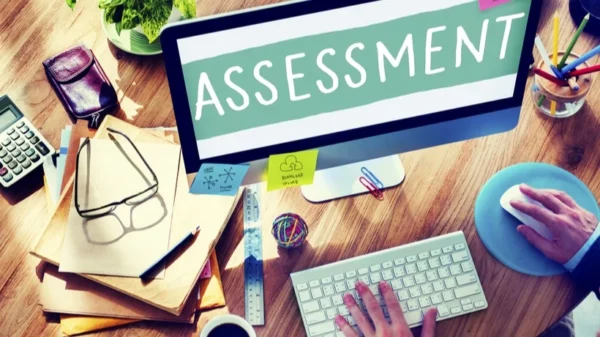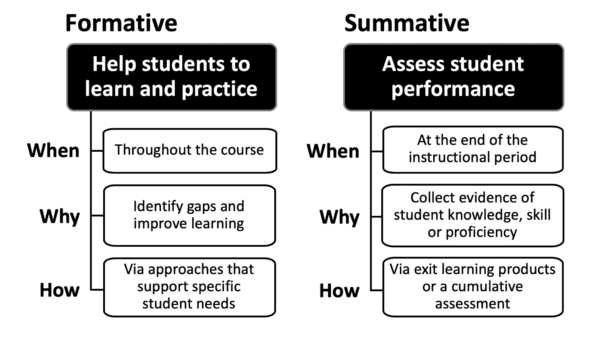Edtech assessment strategies are a key pillar of edtech success in contemporary times. Edtech has revolutionized the way students learn by providing them with a personalized learning experience. It has also made it easier for teachers to assess student performance and provide feedback in a timely and efficient manner.

The role of assessment in edtech is to ensure that students are learning at their own pace and are able to grasp concepts effectively. It is also used to evaluate student performance and provide feedback to teachers, who can then adjust their teaching methods accordingly. With the help of edtech, assessment has become more interactive and engaging, which has increased student motivation and engagement.
Assessment tools and technologies in edtech have made it possible for teachers to assess student performance in a variety of ways. These tools include quizzes, tests, surveys, and interactive simulations. They also include technologies such as artificial intelligence, machine learning, and data analytics, which can be used to analyze student performance and provide personalized feedback. These tools have made it possible for teachers to provide timely and accurate feedback to students, which has led to improved learning outcomes.
Key Takeaways
- Assessment plays a crucial role in edtech by providing personalized learning experiences and evaluating student performance.
- Assessment tools and technologies in edtech have made it possible for teachers to assess student performance in a variety of ways and provide timely and accurate feedback.
- The future of educational assessment is likely to involve more advanced technologies such as artificial intelligence and machine learning, which will further enhance the learning experience for students.
1. The Role of Assessment in EdTech
Assessment is a critical aspect of education that enables teachers to evaluate students’ learning progress and provide feedback to help them improve. In edtech, assessment plays an even more significant role because it allows for personalized and adaptive learning experiences that cater to individual student needs.
Formative vs. Summative Assessment

There are two main types of edtech assessment strategies: formative and summative. Formative assessments are conducted during the learning process to monitor students’ progress and provide feedback to help them improve. Summative assessments, on the other hand, are conducted at the end of a learning module or course to evaluate students’ overall learning outcomes.
Formative assessments are a crucial edtech assessment strategy because they enable teachers to identify students’ strengths and weaknesses, adjust their teaching methods, and provide personalized learning experiences. Formative assessments can take various forms, such as quizzes, surveys, interactive games, and simulations. These assessments provide immediate feedback, which enhances students’ learning experiences and helps them stay motivated.
Summative assessments are essential in edtech because they enable teachers to evaluate students’ overall learning outcomes and progress. Summative assessments can take various forms, such as exams, projects, and presentations. These assessments provide a comprehensive evaluation of students’ learning outcomes and help teachers identify areas that need improvement.
The Impact of Technology on Assessment Practices
Technology is the foundation of edtech assessment strategies by providing tools and platforms that enable teachers to conduct assessments more efficiently and effectively. Technology has also enabled teachers to provide personalized and adaptive learning experiences that cater to individual student needs.
Therefore, assessment plays a critical role in edtech by enabling teachers to evaluate students’ learning progress and provide feedback to help them improve. Formative and summative assessments are vital edtech assessment strategies because they provide teachers with different types of data that enable them to deliver personalized and adaptive learning experiences. Technology has revolutionized assessment practices in edtech by providing tools and platforms that enable teachers to conduct assessments more efficiently and effectively.
2. Assessment Tools and Technologies

Assessment is an essential part of the teaching and learning process. In recent years, the rise of edtech tools has revolutionized the way we assess students. There are many assessment tools and technologies available that can help you assess your students more effectively.
Adaptive Learning Platforms
Adaptive learning platforms are a type of edtech tool that uses artificial intelligence (AI) to personalize learning for each student. These platforms use real-time data to adjust the difficulty of the material based on the student’s performance. This approach ensures that students are always challenged but not overwhelmed. Adaptive learning platforms can be used for formative assessments, quizzes, and personalized learning. Some popular adaptive learning platforms include Edmentum, DreamBox, and Knewton.
Real-Time Feedback Mechanisms
Real-time feedback mechanisms are another type of edtech tool that can help you assess your students more effectively. These tools provide immediate feedback to students, allowing them to adjust their learning strategies in real-time. Real-time feedback mechanisms can be used for formative assessments, quizzes, and personalized learning. Some popular real-time feedback mechanisms include Socrative, Nearpod, and Kahoot.
Overall, edtech tools can help you assess your students more effectively and efficiently. Adaptive learning platforms and real-time feedback mechanisms are just two examples of the many assessment tools and technologies available. By using these tools, you can provide better learning experiences for your students and help them achieve their full potential.
3. Evaluating Student Performance

Assessing student performance is a critical part of the learning process, and edtech can help you do it more effectively. By using data-driven insights and assessment for learning, you can monitor student progress, engagement, and outcomes and adjust your teaching accordingly.
Data-Driven Insights
One of the most significant advantages of using edtech for assessment is the wealth of data it provides. By tracking student performance, you can identify areas where students are struggling and adjust your teaching to address those issues. You can also use data to monitor student engagement and progress, identifying students who may need additional support or challenge.
To make the most of data-driven insights, it’s essential to choose an edtech platform that provides robust analytics and reporting capabilities. Look for a platform that allows you to track student performance over time, compare student progress to class averages, and identify trends and patterns in student learning.
Assessment for Learning
Assessment for learning is among edtech assessment strategies that focus on using assessment as a tool for improving student learning. By providing regular feedback to students, you can help them identify areas where they need to improve and provide them with the support they need to succeed.
To implement assessment for learning effectively, it’s essential to use a variety of assessment methods, including formative and summative assessments. Formative assessments are assessments that are used to monitor student progress and provide feedback to students, while summative assessments are used to evaluate student learning at the end of a unit or course.
It’s also important to provide students with clear learning objectives and expectations, so they know what they need to do to succeed. By setting clear expectations and providing regular feedback, you can help students stay motivated and engaged in their learning.
Evaluating student performance is an essential part of the learning process, and EdTech can help you do it more effectively. By using data-driven insights and assessment for learning, you can monitor student progress, engagement, and outcomes and adjust your teaching accordingly.
4. Challenges and Considerations in EdTech Assessment

Assessing students in an online environment presents unique challenges and considerations. In this section, we will discuss two critical challenges that need to be addressed to ensure fair and equitable assessments and to address technological barriers.
Ensuring Fairness and Equity
One of the most significant challenges in edtech assessment is ensuring fairness and equity. Many students come from diverse backgrounds and have different learning needs. Therefore, it is essential to develop assessments that cater to the diverse student needs.
To achieve this, assessments should be designed to accommodate different learning styles, cultural backgrounds, and language abilities. In addition, assessments should be evaluated for bias, including gender, race, and ethnicity.
Universal design is a key consideration in creating fair and equitable assessments. Universal design refers to the design of products and environments that are accessible to people with a wide range of abilities. In the context of edtech assessment, universal design means designing assessments that can be used by all students, regardless of their physical, sensory, or cognitive abilities.
To ensure fairness and equity, it is also essential to provide students with clear instructions and expectations for assessments. This includes providing students with clear guidelines for how to complete the assessment and what is expected of them.
Addressing Technological Barriers
Students may face technological barriers such as slow internet connections, outdated hardware, or limited access to technology. To address these barriers, it is essential to provide students with access to the necessary technology and to ensure that assessments are designed to work on a wide range of devices and internet connections.

In addition, assessments should be designed to be user-friendly and intuitive. This includes providing students with clear instructions and feedback, as well as designing assessments that are easy to navigate and understand.
Finally, it is important to evaluate the accessibility of assessments for students with disabilities. This includes providing accommodations such as screen readers or alternative input devices for students with visual or motor impairments.
From the above dynamics, edtech assessment strategies present unique challenges and considerations that need to be addressed to ensure fair and equitable assessments for all students. By designing assessments with universal design principles and addressing technological barriers, we can create assessments that are accessible to all students and provide them with the opportunity to demonstrate their knowledge and skills.
5. Future Trends in Educational Assessment
Edtech assessment strategies are evolving, and with the rise of educational technology, it is essential to keep up with the latest trends. Let us explore two future trends in educational assessment, including the integration of AI and learning analytics and the shift towards competency-based evaluation.
Integration of AI and Learning Analytics
Artificial intelligence (AI) and learning analytics are two technologies that are transforming edtech assessment strategies. AI can analyze student data, predict student performance, and provide personalized feedback. Learning analytics can help educators identify patterns in student behavior and performance, which can be used to improve teaching strategies.
The integration of AI and learning analytics can help educators gain insights into student progress and help them make informed decisions about teaching strategies. By using AI and learning analytics, educators can identify areas where students need additional support and provide personalized feedback to help them improve their performance.
The Shift Towards Competency-Based Evaluation
Traditional evaluation methods focus on grades and test scores, which can be limiting and do not provide a complete picture of student performance. Competency-based evaluation focuses on assessing students’ skills and abilities rather than their grades. This approach allows educators to assess students’ progress in real time and provide personalized feedback to help them improve.
The shift towards competency-based evaluation is gaining momentum in education, and it is becoming increasingly popular in online learning environments. This approach allows educators to assess students’ progress based on specific skills and competencies, which can help them identify areas where students need additional support.
In conclusion, the integration of AI and learning analytics and the shift towards competency-based evaluation, among other edtech assessment strategies discussed, are trends in education that educators should be aware of. By embracing these trends, educators can gain insights into student progress, identify areas where students need additional support, and provide personalized feedback to help them improve their performance.
